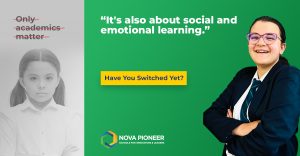Understanding the Factors Behind the Cambridge AS Exam Results
Over the past few days, a lot has been published about the Cambridge AS pass rate at some independent schools offering the Cambridge curriculum. While I am in no position to comment on the dynamics internal to those schools, I am concerned about the apparent misunderstandings around the nature of
Over the past few days, a lot has been published about the Cambridge AS pass rate at some independent schools offering the Cambridge curriculum. While I am in no position to comment on the dynamics internal to those schools, I am concerned about the apparent misunderstandings around the nature of the Cambridge curriculum that may have been perpetuated in those articles.
As more and more parents are looking for alternatives for their children’s schooling, we have seen a surge in the popularity of the Cambridge curriculum. Many new, smaller, private institutions (and some bigger ones), are attempting to capitalise on this trend. Quite often, none of the parties involved will have a full understanding of the actual progression pathway to a University school exit with this qualification.
Is there a “matric equivalent” in the Cambridge curriculum? The short answer is, no. Here is why:
The Cambridge Curriculum is designed as a 13-year programme. At Secondary school level, there are three main exit examinations: IGCSE which is their version of a General Academic Literacy band, followed by AS and then A-levels. The confusion arises from the separation of AS and A-levels.
Exiting school after doing AS (especially if that AS is offered over just one year), is very challenging. The difference between IGCSE and AS is significant. Remember that AS and A-levels are seen as University Preparation courses. The workload and difficulty levels do not increase in a linear fashion from IGCSE to AS. In our experience, (and this is borne out by international data), students who achieved a “B” for a subject at IGCSE, can expect to achieve a “C” or even a “D” at AS level. Students who then proceed to A-levels, tend to perform far better at the A-levels than they did with just AS.
Why is there the misconception that AS “equates” matric? It stems, in part, from the Universities South Africa (USAF) entry requirements to University for students doing the Cambridge Curriculum. There are three different combinations of subjects for students to gain University entry, which stretches across IGCSE, AS and A-levels. This is why schools who offer the full Cambridge curriculum cannot report on a “Matric pass rate”. There isn’t a single pathway or a single year that counts as “matric”. Instead Cambridge offers students multiple pathways to tertiary studies from IGCSE through A-levels, and which they can change over the course of their studies to suit their evolving interests and marks. And this does not even include the pass requirements set by SAQA for a Diploma pass or simple exit pass.
As an illustration, I will only compare two:
A University pass can consist of passing four AS subjects with a minimum of a D symbol plus one (or two) IGCSE subjects with a C minimum. Or, it can also be three A-level (Year 13) subjects with an E minimum plus one IGCSE with a C. And so on.
The option to exit after Grade 12 with a one-year AS is by far the most challenging. We also had to learn this through hard experience. Students and parents who embark on the Cambridge journey should really see it as a 13-year pathway to full A-levels, with the option to exit after Grade 12 with AS being a possible bonus – which a number of students do achieve. This might not sit comfortably with many students who are used to the South African 12-year pathway, but the benefits are real. Students are far better prepared for success at University and they are much more competitive when applying to Universities both locally and abroad. However, students need to be guided by experts to make the best possible decisions about the appropriate pathways available to them.
A question that might also be asked is: Why is this trending right now? Cambridge has been around for a while?
Many of the schools that offered the Cambridge curriculum in the past, only offered it as an extension programme for their academically stronger pupils. Most of these schools only report on their final A-level results, not AS. The academic screening of students before being granted admission at these schools is very rigorous.
What is happening now is that there are more and more inclusive schools, offering the curriculum to a broader range of students. Offering this challenging programme to a broader range of abilities does present a challenge for which these schools must be well-prepared.
It is the duty of schools and parents to develop a deep understanding of what is really required by this demanding – but ultimately rewarding – curriculum. When taught, managed, and structured properly, it can provide wonderful opportunities to many more students than what was previously assumed.





